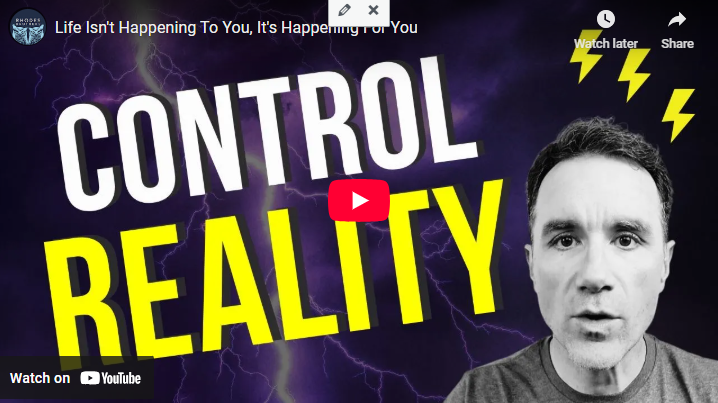Life often throws curveballs that can leave us feeling overwhelmed and defeated. In these moments, staying positive can seem like an insurmountable challenge.
But what if I told you that the key to maintaining a positive outlook, even in the darkest of times, is within your grasp? It’s all about shifting your perspective, and it’s a skill that anyone can master with the right mindset and strategies.

John S. Rhodes, one half of the dynamic Rhodes Brothers duo, recently shared a profound insight that has the power to transform how we view and react to life’s challenges. In his words, “Everything that we are looking at here together is that things happen for you. Every single thing, every single day, every experience you have is happening for you.”
This simple yet powerful shift in thinking can be the catalyst for turning your life around, helping you navigate through tough times with grace and optimism. But how exactly can we implement this perspective in our daily lives? That’s what we’re here to explore.
TL;DR
- Shift your mindset from “why is this happening to me?” to “how is this happening for me?”
- Embrace challenges as opportunities for growth and learning
- Implement practical strategies to maintain a positive outlook
- Avoid common pitfalls that lead to negative thinking
- Utilize tools and resources to support your journey towards positivity
Let’s dive into the transformative power of positive thinking and how you can harness it to thrive, even in the face of adversity.
The Power of Perspective: Reframing Your Challenges
Life often presents us with challenges that can seem overwhelming at first glance. However, the way we perceive these challenges can dramatically influence our ability to overcome them. Reframing our challenges is not about denying their difficulty, but rather about finding the hidden opportunities within them. This powerful shift in perspective can transform our approach to life’s obstacles, turning them into catalysts for personal growth and success.
Understanding the “For You” Mindset
The cornerstone of staying positive during dark times lies in understanding that every experience, whether seemingly good or bad, is happening for you, not to you. This subtle shift in perspective can have a profound impact on how you navigate life’s challenges.
John S. Rhodes emphasizes this point, stating, “You either win or you learn. You either are successful or something transpires such that you can make something great out of it.” This mindset encourages us to view every situation as an opportunity for growth, learning, or eventual success.
The Science Behind Positive Thinking
Research supports the benefits of maintaining a positive outlook. A study published in the Journal of Personality and Social Psychology found that individuals with a positive mindset were more likely to have better cardiovascular health and lower rates of depression. This isn’t just feel-good advice; it’s backed by science.
Practical Strategies for Cultivating Positivity
While understanding the power of perspective is crucial, putting it into practice requires consistent effort and specific strategies. By implementing these practical techniques, you can train your mind to naturally gravitate towards a more positive outlook, even in the face of adversity. These strategies are not just feel-good exercises; they are backed by psychological research and have been proven to enhance mental resilience and overall well-being.
1. Practice Gratitude Daily
One of the most effective ways to shift your perspective is through gratitude. Start each day by listing three things you’re grateful for. This simple practice can rewire your brain to focus on the positive aspects of your life, even during challenging times.

Tool: Use a gratitude journal app like “Gratitude” or “Day One” to make this practice a habit.
2. Reframe Negative Situations
When faced with a difficult situation, challenge yourself to find the silver lining. Ask yourself, “What can I learn from this?” or “How might this be beneficial in the long run?” This reframing technique can help you maintain a positive outlook even in the face of adversity.
3. Surround Yourself with Positivity
The people and content you surround yourself with can significantly impact your mindset. Seek out uplifting friends, inspiring books, and motivational podcasts. Consider following the Rhodes Brothers YouTube channel for regular doses of positivity and practical advice.
4. Practice Mindfulness and Meditation
Mindfulness can help you stay grounded in the present moment, reducing anxiety about the future or regrets about the past. Apps like Headspace or Calm can guide you through short, daily meditations to cultivate a more positive mindset.
Turning Challenges into Opportunities
While it’s natural to feel discouraged when facing obstacles, the ability to see challenges as opportunities is a powerful skill that can significantly impact your personal and professional growth. This shift in perspective doesn’t happen overnight, but with practice and the right mindset, you can learn to identify the potential for growth and positive change in even the most difficult situations.
Identifying Growth Potential in Setbacks
Every challenge carries within it the seed of an equal or greater benefit. When faced with a setback, ask yourself:
- What skills can I develop from overcoming this challenge?
- How might this experience prepare me for future success?
- What strengths am I discovering about myself through this process?
Learning from Failure
Failure is not the opposite of success; it’s a crucial part of the journey. Thomas Edison famously said, “I have not failed. I’ve just found 10,000 ways that won’t work.” Embrace failures as learning opportunities and stepping stones to eventual success.
Tools and Resources for Maintaining Positivity
In our digital age, numerous tools and resources are available to support your journey towards a more positive mindset. These resources can provide daily reminders, track your progress, connect you with like-minded individuals, and offer inspiration when you need it most. By incorporating these tools into your daily routine, you can reinforce your positive thinking habits and maintain your motivation even during challenging times.
- Affirmation Apps: Try ThinkUp or I Am for daily positive affirmations.
- Mood Tracking: Use apps like Daylio or Moodpath to monitor your emotional well-being.
- Online Communities: Join platforms like Reddit’s r/GetMotivated for support and inspiration.
- Inspirational Reading: Explore books like “The Power of Positive Thinking” by Norman Vincent Peale or “Man’s Search for Meaning” by Viktor E. Frankl.
Leveraging Positivity for Personal and Professional Growth
A positive mindset isn’t just about feeling good; it’s a powerful tool for achieving your goals. Here’s how you can leverage positivity:
- Enhanced Creativity: Positive emotions broaden your thought-action repertoire, leading to more innovative problem-solving.
- Improved Relationships: Optimism is contagious and can strengthen both personal and professional connections.
- Increased Resilience: A positive outlook helps you bounce back from setbacks more quickly.
- Better Decision Making: Positivity allows for a clearer, more rational approach to challenges.
Common Mistakes to Avoid
- Toxic Positivity: Acknowledge that it’s okay to have negative emotions. The goal is not to eliminate them but to manage them effectively.
- Ignoring Reality: Positive thinking doesn’t mean ignoring problems. Address challenges head-on, but with an optimistic approach.
- Comparison Trap: Avoid comparing your journey to others. Focus on your own growth and progress.
- Neglecting Self-Care: Positivity requires energy. Prioritize your physical and mental health through proper nutrition, exercise, and rest.
Remember, as John S. Rhodes says, “You are part of what’s happening, and everything about life, everything that’s happening right here, right now, even this video, my words, are happening for you.”
Actionable Steps
- Morning Mindset Ritual: Start each day with a positive affirmation or gratitude practice.
- Reframe Challenge: When faced with a difficulty, write down three potential positive outcomes or lessons.
- Positivity Audit: Review your social media, friendships, and content consumption. Eliminate or reduce exposure to sources of negativity.
- Learn and Grow: Commit to learning one new thing from every challenging situation you face.
- Share Positivity: Uplift someone else daily through a kind word, gesture, or sharing an inspiring message.
Frequently Asked Questions
How can I stay positive when everything seems to be going wrong?
Focus on what you can control, practice gratitude for the small things, and remember that challenges are temporary. Use the “for you” mindset to find potential benefits or lessons in each situation.
Is it realistic to be positive all the time?
It’s not about being positive all the time, but rather cultivating a generally optimistic outlook. It’s normal and healthy to experience a range of emotions. The goal is to develop resilience and the ability to bounce back from negative experiences.
How long does it take to develop a more positive mindset?
Developing a positive mindset is an ongoing process. While some people may notice changes in a few weeks, it typically takes consistent practice over several months to rewire thought patterns significantly.
Can positivity really impact my physical health?
Yes, research has shown that a positive outlook can lead to better cardiovascular health, improved immune function, and even increased longevity. It’s not just good for your mind; it’s good for your body too.
What if my negative thoughts are related to a mental health condition?
While positive thinking can be beneficial, it’s not a substitute for professional help if you’re dealing with a mental health condition. Consider combining positivity practices with therapy or counseling for comprehensive support.
How can I help my children develop a positive mindset?
Model positive thinking, encourage them to express gratitude, help them reframe challenges, and praise their efforts rather than just outcomes. Make it a family practice to discuss daily “wins” or positive moments.
Can being too positive be harmful?
Yes, toxic positivity or denying negative emotions can be detrimental. It’s important to acknowledge and process all emotions while maintaining an overall optimistic outlook.
How do I maintain positivity in a negative work environment?
Focus on aspects of your job you can control, seek out like-minded colleagues, set boundaries with negative influences, and consider how your current role contributes to your long-term goals.
What role does self-talk play in maintaining a positive mindset?
Self-talk is crucial. Practice catching negative self-talk and consciously replacing it with more balanced or positive statements. Over time, this can significantly impact your overall mindset.
How can I use positivity to achieve my goals?
Use positive visualization to imagine achieving your goals, break them down into manageable steps, celebrate small victories along the way, and use setbacks as learning opportunities rather than reasons to give up.
Embracing the Power of Positivity
As we’ve explored throughout this article, staying positive during dark times is not just a feel-good platitude—it’s a powerful tool for transforming your life. By shifting your perspective to view challenges as opportunities for growth, you open yourself up to a world of possibilities.
Remember John S. Rhodes’ powerful words: “Everything is happening for you.” This mindset can be your guiding light through life’s storms, helping you navigate difficulties with grace and emerge stronger on the other side.
The strategies we’ve discussed—from daily gratitude practices to reframing negative situations—are not just theoretical concepts. They are practical, actionable steps that you can begin implementing today. Each small shift in your thinking brings you closer to a more resilient, optimistic, and fulfilling life.
As you embark on this journey towards a more positive outlook, remember that it’s a process. Be patient with yourself, celebrate small victories, and keep pushing forward. The power to transform your perspective and, by extension, your life, lies within you.
For more insights, strategies, and motivation to help you succeed in all areas of life, we encourage you to check out and subscribe to the Rhodes Brothers YouTube Channel . Our videos offer a wealth of information and inspiration to support you on your journey towards a more positive, fulfilling life.
Resource List
Books
- “The Power of Positive Thinking” by Norman Vincent Peale
- “Learned Optimism: How to Change Your Mind and Your Life” by Martin Seligman
- “The Happiness Advantage” by Shawn Achor
- “Mindset: The New Psychology of Success” by Carol S. Dweck
- “The Obstacle Is the Way” by Ryan Holiday
Podcasts
- “The Science of Happiness” by PRX and UC Berkeley’s Greater Good Science Center
- “Optimal Living Daily” hosted by Justin Malik
- “The Positive Psychology Podcast” by Kristen Truempy
- “Happier with Gretchen Rubin”
- “The Tony Robbins Podcast”
Courses
- “The Science of Well-Being” by Yale University
- “Positive Psychology” by the University of Pennsylvania
- “Mindfulness and Resilience to Stress at Work” by UC Berkeley
- “Positive Psychology: Resilience Skills” by the University of Pennsylvania
- “The Happiness Lab” by Dr. Laurie Santos
Apps and Tools
- Headspace (for meditation and mindfulness)
- Calm (for sleep, meditation, and relaxation)
- Happify (for science-based activities and games to overcome negative thoughts)
- ThinkUp (for positive affirmations)
- Daylio (for mood and activity tracking)
- Blinkist (for summarized insights from non-fiction books)
- Streaks (for building positive habits)
- Forest (for focus and productivity)
- MoodKit (for mood improvement and self-awareness)
Websites and Online Communities
- Greater Good Science Center
- Positive Psychology Center
- Action for Happiness
- r/GetMotivated
- TED Talks on Happiness and Positive Psychology
By utilizing these resources and implementing the strategies discussed, you’ll be well-equipped to cultivate and maintain a positive mindset, even in the face of life’s greatest challenges. Remember, every step you take towards positivity is a step towards a more fulfilling and resilient life.





